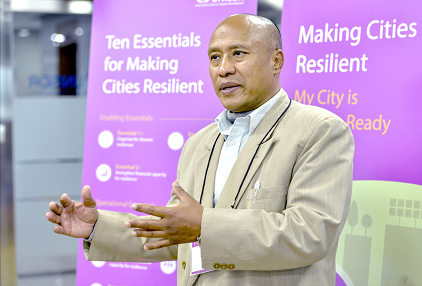
Purusotam Shakya is committed to making Kathmandu more resilient to future earthquakes (photo:UNISDR)
By Andy McElroy
INCHEON, 24 January 2018 – Every day when Purusotam Shakya steps into his office in the heart of Kathmandu, Nepal’s bustling capital city, three words leap to the front of his mind: “Build Back Better”.
Mr. Shakya is the Director of Kathmandu Metropolitan City’s Disaster Management Department, and relishes his key role in the ongoing reconstruction of the city after the devastating April 2015 earthquake.
The 7.6-magnitude earthquake on 25 April 2015, in the Kathmandu Valley killed almost 9,000 people and injured more than 23,000 others. Eight million people were affected, 605,282 buildings destroyed and 288,261 damaged.
“The reconstruction process is extremely challenging. At the same time it is a real opportunity for our city to make itself safer and more resilient to future earthquakes. In this regard, we are now strongly implementing our building codes,” Mr. Shakya said.
“We are also trying to address two of the toughest problems of any reconstruction. First, in terms of funding for disaster risk reduction, we are collecting an annual 100 rupee (USD1) levy from each household when they pay their land and property tax.
“Second, in terms of local capacity we have established disaster management committees in each of the city’s 32 wards which link up to the newly set-up Metropolitan Emergency Operations Centre.”
In another initiative, Kathmandu Metropolitan City is partnering with Yokohama city, which sees specialist Japanese seismic engineers training their Nepali colleagues in appropriate construction designs and techniques.
Mr Shakya was speaking a week after the Nepali Prime Minister Mr. Sher Bahadur Deuba reiterated the national government’s “firm commitment” to disaster risk reduction and community resilience across the hazard-prone country.
Prime Minister Deuba said that the majority of deaths during the April 2015 earthquake were caused by weak structures rather than the earthquake itself. “As disasters are equally severe to everyone, it is our responsibility and we all need to make a firm commitment towards disaster risk reduction,” he said, according to local media.
The Prime Minister was speaking on the occasion of Nepal’s annual Earthquake Safety Day, which carried the theme 'Empowering Local Communities and Governments: Strong Foundation of Earthquake Safety'.
Earthquake Safety Day commemorates the Great Nepal-Bihar Earthquake of 1934, which killed up to 12,000 people and destroyed and damaged 200,000 buildings.